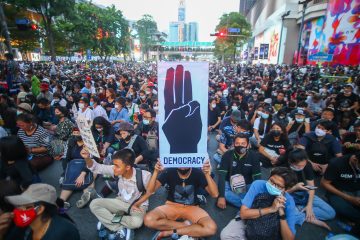In politics, there are insiders and there are outsiders.
Where there have been citizens, there are those considered non-citizens. There are documented immigrants and sans papiers. Where there are the rich, there are the poor. Marxists say there is the bourgeoisie and the proletariat – the exploiter and the exploited. Historians recall the times of lord and serf, of monarch and subjects – in politics, there are those who are represented, and those without representation.
What do we mean when we talk about politics at or from the periphery? A periphery exists always in relation to a centre. If the centre represents the seat of power, the dominant institutions, the hegemonic practices that inform policy and shape social structures, the periphery by contrast is a place outside the boundary of established and stabilised power.
The periphery is the place where the outsiders look in, observing social forces and building heterodox ways of thinking that challenges the foundations upon which power resides. The periphery is a place where new ideas are forged.
It is fair to say that although academia has its critics, our institutions are increasingly decentring the white, heteronormative, cisgendered male subject, and in doing so, recovering forgotten and underwritten genealogies, reshaping our ideas of liberty, democracy and citizenship.
Geopolitically, we are arguably moving away from the unipolarity of the American century and towards a multipolar landscape, inviting reflections from regional and subaltern perspectives, and considering the impact of new alliances and emerging relationships.
Politically, all good democrats will claim to be receptive to the periphery, to bear witness to social suffering and those marginalised by social pathologies, critically attuned to the prejudices that permeate, and the assumptions that remain – and yet, our increasingly polarised and divided politics appears unable to resolve these asymmetries of power. We talk a good game, but the problems remain. In this context, new ideas are more than welcome.
The series adopts this spatial metaphor of the ‘centre/periphery’ to explore new ways of political thinking that challenges, discomforts, reinterprets and problematises convention. It brings together a collection of academic blogs that provide exciting new interpretations, practices, methodological approaches, perspectives and objects of inquiry.
The series is a celebration of politics as an increasingly interdisciplinary discipline, with writers from both inside and outside the Department of Politics & International Relations, and contributions from both inside and outside the University of Oxford. We hope you enjoy the eclectic and provocative mixture of topics, approaches and ideas.

From periphery to core: COP27 and the era of loss and damage

What is peripheral about Thai (democratic) politics?

“Laters, baby!”: How the British Prime Ministers’ discourse of delay turned Indyref2 into a peripheral issue

A Historical Perspective on the Political Limits of “My Body, My Choice”

Should Animals Have Political Rights?


